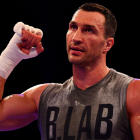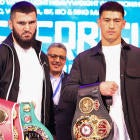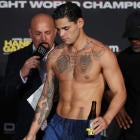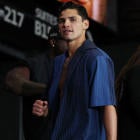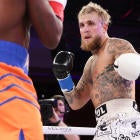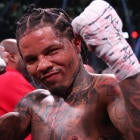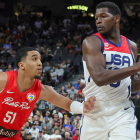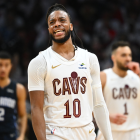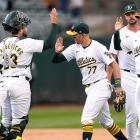For as historically dominant as Wladimir Klitschko had been from 2006 to 2015 -- defending his heavyweight titles 18 consecutive times against anyone willing to get in line to face him -- his reign came crashing down in surprising fashion thanks to an upset loss to Tyson Fury.
Unlike early in his career, Klitschko didn't crash and burn in spectacular fashion by getting knocked out or succumbing to exhaustion. In some ways, his November 2015 decision loss to Fury was much worse as Klitschko appeared gun shy and confused, refusing to show any urgency until the final minute of the fight.
It would be misinformed and unfair to suggest Klitschko, then 39 and a veteran of 68 pro fights over a near 20-year career, saw his legacy dramatically altered with one defeat in a fight most observers felt was painfully boring to watch. But it would be just as naïve to pretend a part of Klitschko's aura wasn't left behind that night inside the ESPRIT Arena in Dusseldorf, Germany.
Klitschko dominated the weakest era in the history of the heavyweight division. Through no fault of his own, the majority of his victories came against opponents who couldn't match him in more than one or two categories in terms of size, speed, power, technique, smarts and aggressiveness.
When he finally did meet one in Fury -- taller and longer with faster hands and an unorthodox game plan designed to snake charm him into passivity -- Klitschko came up uncharacteristically short.
Maybe it was age or an off night. But either way, Klitschko faces a series of difficult questions entering his return after 17 months of contemplation.
At 41, Klitschko (64-4, 53 KOs) will challenge unbeaten IBF titleholder Anthony Joshua (18-0, 18 KOs) on Saturday at London's Wembley Stadium (Showtime, 4:15 p.m. ET; replay on HBO at 11 p.m. ET). The vacant WBA title, Klitschko's former belt that Fury surrendered last October in order to address mental health and substance abuse issues, will also be at stake.
Let's take a look at the five biggest questions Klitschko will be forced to answer inside the ring:
1. Did Klitschko merely get old overnight against Fury? Father Time remains undefeated in boxing, as it does in all sports, meaning the daunting day will come for any athlete when he wakes up and no longer has it. Heavyweights, however, historically age more gracefully than others in boxing and it's difficult to believe age was the culprit for Klitschko in this case. A model of professionalism and fitness, who preserved himself well into his late 30s by staying in phenomenal shape, Klitschko also suffered very little damage in recent fights thanks to his size and cautious defensive style taught by Hall of Fame trainer Emanuel Steward. His fights leading up were also strong, including a 2014 knockout of Kubrat Pulev that many consider the finest performance of Klitschko's career.
2. How much of the Fury loss can be passed off as a lack of focus? Not taking his opponent's lightly had long been a big part of Klitschko's longevity. But the former champion is human, after all, and had he entered training camp for the Fury fight not as focused as usual, it would have been understandable. Klitschko had initially postponed the fight by one month to heal from a calf injury. At the same time, his fiancee, actress Hayden Panettiere, had checked into a treatment center for postpartum depression after the birth of their first child nearly one year earlier.
"Love boxing? Don't forget to subscribe to my podcast In This Corner with Brian Campbell where I break down some of the biggest fights and fighters in the sport each week."
There was also little evidence to suggest that Fury, who looked as focused and disciplined inside the ring as we have seen, would put forth such a calculated performance. Fury had battled weight issues in recent fights and hadn't looked like the same fighter who originally burst on the scene. Most expected Fury to succumb by early knockout. Klitschko has said in recent weeks that the loss relieved him of many years of pressure he had carried to maintain his success and title reign, and now feels a new sense of freedom entering his comeback bout.
3. Have Klitschko's chin issues been completely resolved? I asked Joshua this question directly during Wednesday's media teleconference, which he instantly dismissed, pointing to Klitschko's 10-year title reign in a division where one punch can end a fight. It's true that Klitschko is no longer the same fighter who was stopped three times between 1998 and 2004. It would also be false to say that he never again faced another dangerous puncher after getting up off the canvas three times to outlast Sam Peter in 2005. But Klitschko also never put himself in danger enough for us to find out if his chin had recemented thanks to his size, defense and the level of competition he has faced.
While this doesn't mean Klitschko will crumble the first time Joshua hits him clean, it does mean that protecting his chin at all costs has become his life's mission inside the ring, at times to his detriment. This is why his fights against Fury and his 2008 unification bout with Sultan Ibragimov were so boring. Considering Joshua's combination of speed, strength and athleticism is greater than any fighter Klitschko has faced in recent memory, it's difficult to imagine Klitschko being willing to punch with Joshua at close range if he isn't able to control distance with his jab against a fighter who is equally as tall with a slightly longer reach. This means Klitschko's confidence in his own chin will need to be at a place it hasn't been since the first Peter fight. It also means an inordinate amount of pressure will be placed on referee David Fields on Saturday.
4. Can this version of Klitschko win a fight if the refereeing becomes conservative? This becomes a very interesting question when you consider what has happened over the second half of Klitschko's career each time an opponent has gotten close to moving inside of his jab on a consistent basis. Fury ultimately didn't have the power to floor Klitschko but just the threat of him using his length, speed and awkward angles to reach his chin forced Klitschko to recoil and stop throwing punches.
This has been a repeated occurrence with Klitschko but has often been covered up by how deft he is at clinching his opponents after one punch. It has become a gratuitous practice for Klitschko, particularly when he can exploit liberal officiating, as he did with referee Luis Pabon against Alexander Povetkin in 2013. The second half of Klitschko's 2015 victory over Bryant Jennings devolved just the same into a holdfest once the athletic Jennings found an avenue (and the courage) to circumvent his jab by uncorking looping right hands. If Fields begins to warn Klitschko for holding and legitimately threatens to take away points, not allowing him to lean on Joshua and wear him down, Klitschko will be forced to fight his way to an action victory.
5. Does he still have the heart and passion to come from behind if necessary against a young, hungry lion in Joshua? Klitschko not only didn't have it against Fury while showing an almost disturbing lack of urgency, he mostly looked like he just didn't want it. All Klitschko had known entering that fight over the previous 10 years was dominance by building a lead behind his jab before systematically putting opponents away with his big right hand. After the Peter fight, Klitschko had never been forced to rally or adjust thanks to his advantages in power and technique. It's difficult not to become a front-runner of sorts when rallying is a muscle you haven't had to exercise. Should Joshua's youth become too much at some point during the fight, does Klitschko have enough left in the tank to put himself in danger of a knockout in order to gain the glory that would come with regaining his title? Above all else, that's the biggest question he faces on Saturday.












